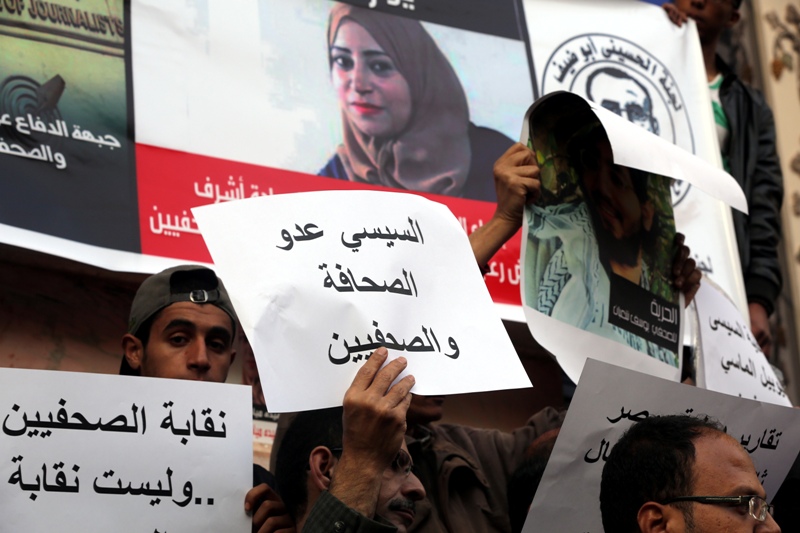A U.N. body of human rights experts has called for the release of nine journalists that Egypt is holding in connection with the bloody clearing of Cairo’s Rabaa Square in August 2013, saying that their detention is arbitrary and a violation of their human rights.
The U.N. Working Group on Arbitrary Detention, in an opinion adopted on April 19 and released last month, said Egypt’s government had failed to rebut the “reliable” claim that the journalists were “arrested, detained and sentenced solely for having peacefully exercised their right to freedom of opinion and expression”.
The journalists are currently being retried on accusations that they worked as the “Rabaa Operations Room” to fabricate news and sow chaos in a plot to undermine the government installed in July 2013 when Egypt’s military deposed then-President Mohamed Morsi, the head of the Muslim Brotherhood. The military’s move was met by a massive protest by Brotherhood supporters, which ended when security forces cleared Rabaa Square in raids that left nearly 1,000 people dead.
Despite the journalists’ claim that they were present to cover the protests and targeted for their reports on the brutal crackdown, a Cairo court sentenced one of them to death and the others to life in prison in April 2015. Egypt’s Court of Cassation threw out those sentences and ordered a retrial in December, but the proceedings have been marked by repeated delays, with the latest hearing scheduled for today.
UPDATE: Sources told the International Press Institute (IPI) that during the June 7 hearing, the case was adjourned to Aug. 3 and the judge refused to grant the journalists’ request for release pending completion of their retrial.
“We welcome the Working Group’s decision affirming that these journalists were detained for doing their job and we echo its call that they be freed immediately,” IPI Director of Advocacy and Communications Steven M. Ellis said. “The numerous human rights violations highlighted are not isolated to this case and they paint a disturbing portrait. Egypt’s government should heed recommendations put forth by international observers on improving the state of press freedom and the country’s international partners should press it to do so.”
The detained journalists include Waleed Abdulraoof Shalaby – previously sentenced to death – as well as Abdullah Ahmed Mohammed Ismail Alfakharany, Samhy Mostafa Ahmed Abdulalim, Mohamed Mohamed Aladili, Ahmed Sabii, Youssouf Talat Mahmoud Mahmoud Abdulkarim, Hani Salheddin, Mosaad Albarbary and Abdo Dasouki. The Working Group did not assess the situation of five other journalists in the case handed life sentences in absentia.
Given the Egyptian government’s failure to offer a meaningful response, the Working Group said that it relied on arguments made by supporters who said the journalists had suffered numerous abuses.
Egyptian human rights organisation Alkarama noted that the journalists had been detained incommunicado or in solitary confinement, and had endured torture as well as degrading and inhumane conditions. The group also pointed out that the journalists’ lawyers were unable to challenge evidence or call their own witnesses at trial, and the journalists were kept in sound-proof boxes and not allowed in the courtroom when the verdict was read.
Accepting these claims, the Working Group called on Egypt to free the journalists and to compensate them for the violations of their rights. It also noted that the case was not unique, stating that there is “a systemic problem of arbitrary deprivation of liberty of journalists in Egypt”.
In separate, but related, news, last month marked the 1,000th day in detention for Egyptian photojournalist Mahmoud Abou Zeid, also known as “Shawkan”, who was similarly detained while covering the clearing of Rabaa Square. The journalist is accused, along with others, of a role in the murder of a police officer and the burning of a mosque, but his supporters maintain that he was already detained at the time those events happened.
“Shawkan has, by all accounts, similarly suffered deplorable and inhumane conditions, and we are extremely concerned by reports that he is being denied necessary medical treatment,” Ellis said. “Egypt’s continuing detention of him, and of all other journalists in connection with their work, is a gross miscarriage of justice.”
